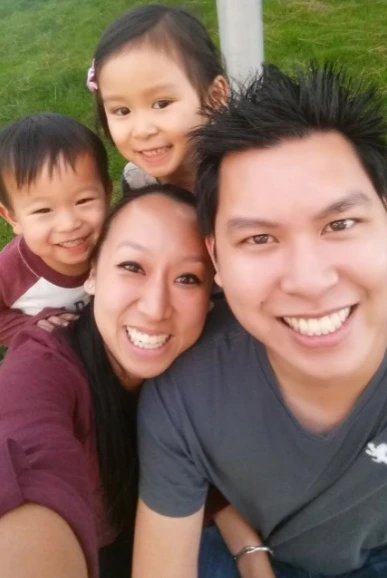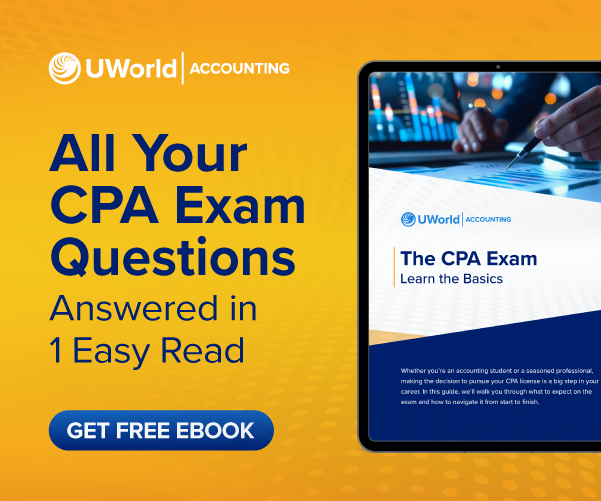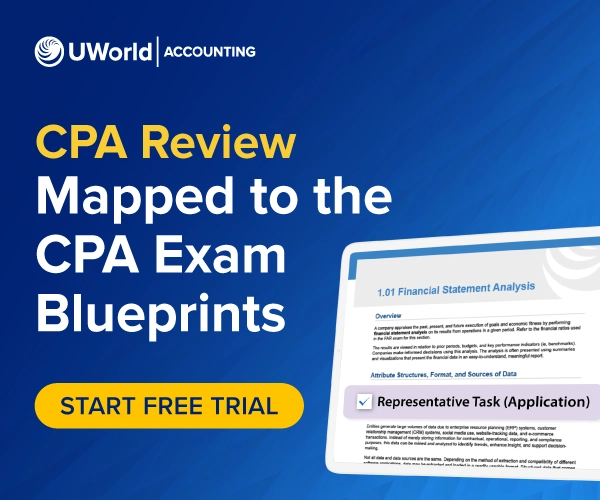Picture this: You’ve just graduated with your bachelor’s degree and are spending a celebratory dinner with loved ones. A family member leans in and asks, “So, what’s next?”
“I’m going to get my J.D. and earn my Certified Public Accountant license,” you say — and the table falls silent, eyes wide with surprise. Are they impressed? Confused? Doubtful you can actually pull it off?
You’re not alone. Quan Vuong, JD, LL.M., CPA, faced the same reactions on his path to becoming a CPA lawyer. Today, he thrives under pressure, embraces challenges, and navigates complex issues across 2 respected fields. With the help of our CPA review course, Quan sharpened his exam prep and achieved dual licensure — proving that the road to becoming a CPA lawyer is rewarding if paved with passion, determination, and grit.
The Making of a CPA Lawyer
Like any demanding career path, the road to becoming an attorney and CPA has highs and lows — and nobody knows this better than Quan. He never set out to be a dual-licensed professional, but life had other plans, beginning at Bank of America.
While working at the financial institution during college, Quan was still figuring things out, knowing only that he wanted a business-related degree. The lightbulb finally illuminated when he discovered how much you could learn about a business by looking at its books. His path became clearer: major in accounting at California State University, Fullerton, then move into tax prep.
Quan accomplished both goals, landing at Grant Thornton LLP and then Haskell & White LLP. He found himself increasingly drawn to tax law's research and strategy side and was eager to learn more. When his managing partner suggested law school, it marked the start of his transition into the legal field.
“Just remember that every video lecture you watch and every practice problem you do is for the greater cause and will help you reach your goal.”
Quan Vuong, JD, LL.M., CPA
Quan made it through the rigors of law school, earning both his JD and LL.M. from Chapman University — but he didn’t stop there. After graduation, he dedicated 8 months to studying for the CPA Exam, all while juggling work and family responsibilities. It took exceptional time management, support from loved ones, and the right CPA test prep to succeed — and he did.
You might be eager to follow in Quan’s footsteps. If so, you’re in good company. Some of the most analytical, organized, adaptable, and personable professionals have walked this path. To stay prepared, you’ll want a clear picture of what to expect.
The Realities of Becoming a Dual-licensed Attorney and CPA
Holding a CPA license and a law degree is more than just a flex at family reunions or on dating apps. It’s a strategic professional move that blends financial savvy with legal acumen. For Quan, it was all about a career in tax research and planning — but everyone’s different. No matter why you’ve chosen to pursue both credentials, you’re stepping onto a demanding path with major payoffs.
The Challenges
- Educational demands: You’ll need to complete 150+ credit hours, attend law school, and pass 2 of the toughest exams: the CPA and bar.
- Burnout risk: Managing 2 high-responsibility careers can lead to long hours, especially during tax season or when trials loom.
- Staying current: As with other fields, law and accounting are constantly evolving. You’ll need to keep up with industry trends and new legislation to avoid falling behind.
- Ethical complexity: Navigating dual professional standards (American Institute of Certified Public Accountants, American Bar Association) requires care and integrity.
The Rewards
- Prestige and credibility: You’re among a rare group of professionals who can speak numbers and legalese fluently. That means you’ll be positioned to “climb the ladder” quickly.
- Financial benefits: Many CPA lawyers earn significantly more than their single-credentialed peers.
- Client trust and satisfaction: You become an all-in-one expert for complex financial-legal issues, offering clients solutions from multiple angles.
- Career flexibility: As a CPA lawyer, your unique background allows you to choose where, when, and how you work. More credentials mean more freedom! Plus, you can pivot between law, accounting, finance, and consulting industries without skipping a beat.
Working as an Attorney CPA
Job Responsibilities
Variety and intellectual challenge are major draws of this profession. One day, you’re prepping tax filings and financial statements. The next, you're researching case law or providing expert testimony in court cases. Here are some typical responsibilities you may juggle as a CPA lawyer:
- Consulting: You might advise individuals or businesses on budgeting, financial planning, or risk management.
- Document review and prep: Think tax returns, contracts, wills, trusts, and audit reports.
- Research and strategy: You’ll stay current on new tax laws or financial regulations.
- Court appearances or negotiations: If you work in litigation, you might represent clients in disputes related to audits, taxes, or business conflicts.
- Forensic accounting: You’ll apply your accounting skills from an investigative angle to uncover financial irregularities like fraud or embezzlement.
- Continuing education: To keep both licenses active, ongoing learning is a must. That includes Continuing Legal Education (CLE) and Continuing Professional Education (CPE) credits.
Work Hours and Work-Life Balance
Lawyers and accountants often clock 60-100 hours a week during peak hours. As you can imagine, the career path of a CPA lawyer can be intense! Busy season for CPAs often overlaps with demanding legal casework, making long hours the norm, particularly in client-facing roles.

- Quan Vuong, JD, LL.M., CPA
“Never think you can’t do something. Whether passing the bar, CPA Exam, or both, anything is within reach as long as you put in the time and effort.”
Career Opportunities and Advancement
Not everyone will share Quan’s excitement for estate planning — and that’s perfectly OK. Maybe corporate compliance or asset recovery is what calls to you. The good news? With the combined skill set of a CPA lawyer, you’ll unlock a wide range of professional pathways, including:
| Accounting Lawyer | Specializes in tax law, financial disputes, mergers & acquisitions, and estate planning |
| Tax Attorney | Advises clients on compliance, tax planning, and litigation |
| Litigator | Focuses on financial or corporate disputes |
| Financial Consultant | Guides clients on investment strategy, risk management, and wealth transfer |
| Compliance Officer | Ensures that companies meet legal and financial regulations |
| Forensic Accountant | Investigates financial fraud and assists with litigation support |
While working at KPMG, PwC, EY, or Deloitte can do wonders for your career, it’s by no means the only way to make an impact as a CPA lawyer. These high-demand roles often fast-track promotions and boost compensation — whether you’re at a Big Four firm, a boutique law office, or running your own firm.
Looking Back on the Journey
As if graduating from law school and passing the bar weren’t hard enough, Quan had the CPA Exam ahead of him. It had been years since his education in accounting, so doubt crept into his mind. Still, he pushed through and believed in himself. How? With premier test prep. He said our CPA review course used every minute of study efficiently and kept him engaged with high-energy lectures. As a result, he aced the CPA Exam, officially earning the title of CPA lawyer.
Quan’s journey was not without trial and error. He had to adjust. He had to persevere. While working toward earning his credentials, he learned a great deal about law and finance — and most importantly about himself. Ultimately, he realized that any goal is within reach as long as you have 3 things: discipline, a positive mindset, and the right roadmap.
Next Steps
If you want your roadmap to lead you to your destination, you'll need trusted resources. Knowing exam requirements will get you to the midpoint — pairing that with premier test prep will take you the rest of the way.
- The CPA Exam: What to ExpectLearn the CPA Exam’s format, sections, and scoring so you know exactly what to expect and can test for success on exam day.
- The Bar Exam: What to ExpectUnderstand what’s ahead by exploring the bar exam’s structure, subjects, and scoring so you can approach exam day with clarity and confidence.
- Top CPA Exam PrepExplore our course options, featuring comprehensive QBanks, study guides, practice exams, performance metrics, and smart flashcards — all contributing to a 94% pass rate.
- Top Bar Exam PrepBoost your study prep with advanced features like bite-sized video lectures, a robust QBank, customizable MBE® practice tests, and a flexible adaptive study calendar.








